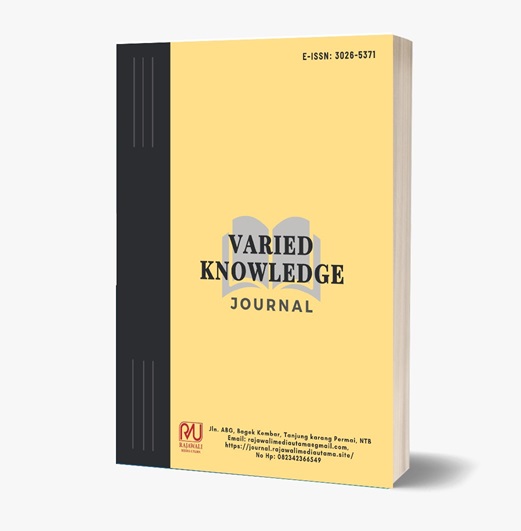Students’ Perceptions on Using Song to Improving Students’ Vocabulary
DOI:
https://doi.org/10.64070/vkj.v1i1.3Keywords:
Vocabulary, Song, Students’ PerceptionAbstract
This study investigates the students’ perceptions on using song to improving the student’s vocabulary. Though, the utilization of the songs as a media may have advantages and disadvantages. Thus, a consideration of its strengths and weaknesses is required. To fill the need, this study aimed to identify the strengths and weaknesses of the media as an tools in improving students ‘vocabulary. The narrative inquiry was chosen as the research design to uncover the story or perception of the students towards the use of songs, by conducting interview. The results of the study indicate that: 1) The strength, including ease of access, effective, easily increases the students’ vocabulary.2) the weakness, including most song using the figurative language.
References
Abidin, M. J. Z., Pour-Mohammadi, M., Singh, K. K. B., Azman, R., & Souriyavongsa, T. (2011). The effectiveness of using songs in YouTube to improve vocabulary competence among upper secondary school students. Theory and Practice in Language Studies, 1(11), 1488–1496. https://doi.org/10.4304/tpls.1.11.1488-1496
Afriyuninda, E., & Oktaviani, L. (2021). The use of English songs to improve English students’ listening skills. Journal of English Language Teaching and Learning, 2(2), 80–85.
Afzal, N. (2019). A study on vocabulary-learning problems encountered by BA English majors at the university level of education. Arab World English Journal, 10. https://doi.org/10.2139/ssrn.3396448
Beare, K. (2010). Music in the ESL classroom. About.com. Retrieved from http://esl.about.com/od/esleflteachingtechnique/a/brainmusic.htm
Creswell, J. W. (2012). Educational research: Planning, conducting, and evaluating quantitative and qualitative research. Pearson.
Faliyanti, E. (2017). The influence of English song toward students’ vocabulary mastery and students’ motivation. Premise: Journal of English Education and Applied Linguistics, 6(1), 77–84.
Hadi, M. S. (2019). The use of song in teaching English for junior high school students. English Language in Focus (ELIF), 1(2), 107–112.
Keraft, G. (2006). Diksi dan gaya bahasa. Jakarta: Gramedia Pustaka Utama.
Kurnia, C. (2017). Increasing young learners’ vocabulary mastery by using English songs. Journal of English Language and Education, 3(1), 42–53.
Kuśnierek, A. (2016). The role of music and songs in teaching English vocabulary to students. World Scientific News, 43(1), 1–55.
Millington, N. T. (2011). Using songs effectively to teach English to young learners. Language Education in Asia, 2(1), 134–141. https://doi.org/10.5746/LEiA/11/V2/A16/Millington
Murphey, T. (1990). Song and music in language learning. Bern: Peter Lang.
Nella, N., Hartati, H., & Lianah, M. (2020). Students’ ability in vocabulary mastery at the second grade students of SMPN 10 Merangin academic year 2019/2020. Selecting, 2(2), 57–67.
Ningsih, N., Sofian, S., & Arifin, Z. (2018). The use of song lyrics to improve students’ vocabulary mastery. Jurnal Pendidikan dan Pembelajaran Khatulistiwa, 7(4).
Safa, A. J. (2018). Effects of using songs on adult EFL learners’ vocabulary learning. Journal of Applied Linguistics and Language Research, 5(3), 101–112. https://doi.org/10.1016/j.jalr.2018.03.002
Solihat, D., & Utami, P. L. (n.d.). Improving students’ listening skill by using English songs. English Review: Journal of English Education, 2301, 7554.
Triwardani, H. R. (2022). Building vocabulary through song as an effective method in learning English. Lingua, 18(1), 98–111.
Yolanda, R. N., Suparman, U., & Riyantika, F. (2021). English teachers’ perception on teaching English vocabulary using songs as media for senior high school in Bandar Lampung. U-JET, 10(1), 89–95.















